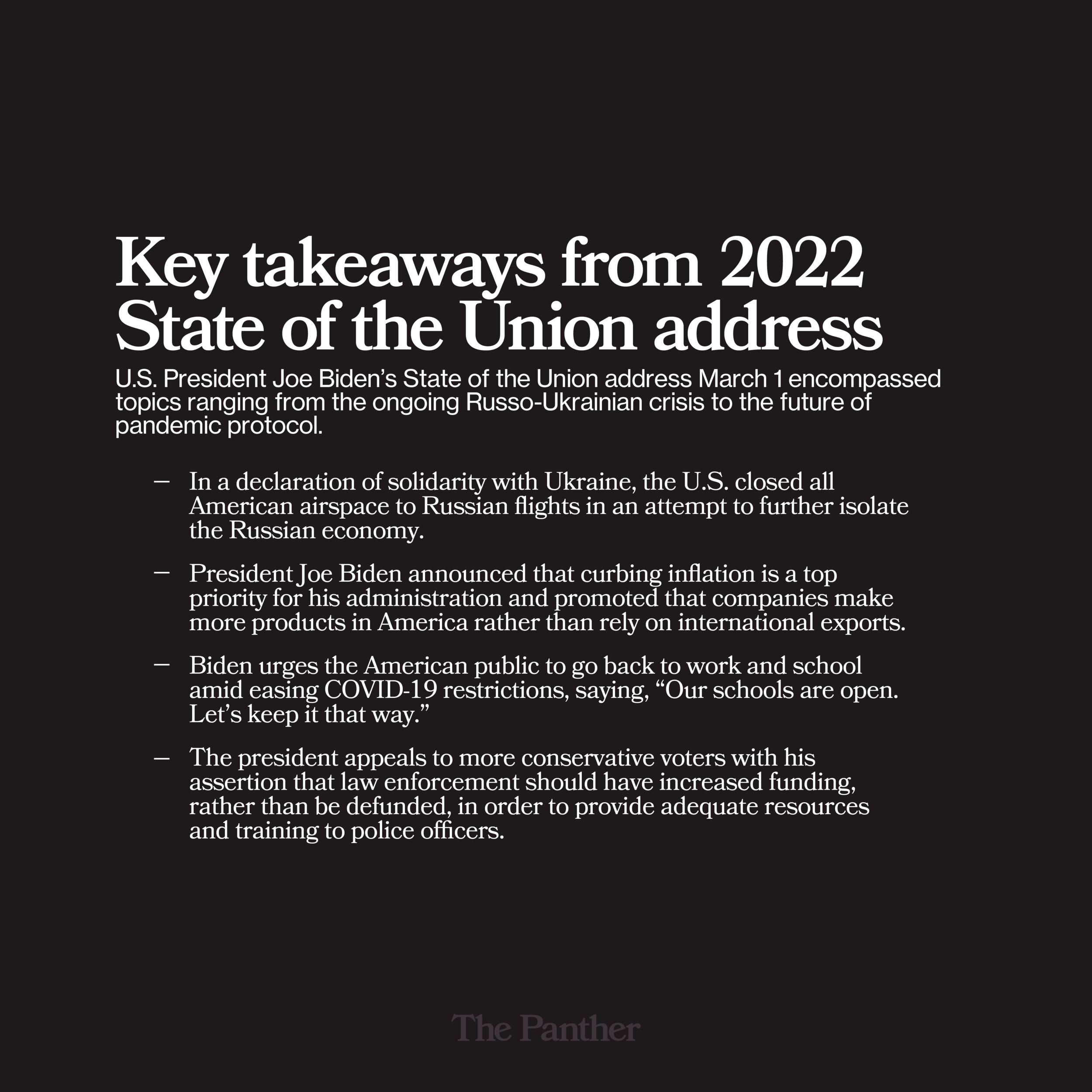‘Underwhelmed, bothered, disappointed’: Chapman community responds to 2022 State of the Union address
Students and professors from either side of the political spectrum agree that U.S. President Joe Biden’s 2022 State of the Union address left much to be desired. Graphic by HARRY LADA, Art Director
Joy Joukhadar, president of Chapman Democrats, and Chapman Republicans member Abbey Umali may be on different sides of the political spectrum, but they can agree on one thing: President Joe Biden’s 2022 State of the Union address disappointed them.
The March 1 address discussed the U.S.’ stance on the Russo-Ukrainian crisis, the economy and inflation, the ongoing COVID-19 pandemic and bipartisan unity, among other items on Biden’s agenda.
Lori Cox Han, Doy B. Henley chair of American Presidential Studies and director of Chapman’s presidential studies program, found the speech to be uninspired. She told The Panther the omission of conversation around student loan forgiveness, climate change and social justice issues — which may have drawn in more young voters — could hurt Democratic turnout in the midterm elections later this year.
“(Biden) really missed an opportunity with his speech (to) have a message that resonates with young voters,” Han told The Panther. “He and the Democrats need high turnout among young voters in November for the midterms ... and he didn’t help himself at all by missing out on some of those issues that are important to young voters.”
Biden’s emphasis on the Russian invasion of Ukraine marks the first time foreign policy has dominated a State of the Union address since former President George W. Bush’s 2002 speech addressed the aftermath of 9/11.
“Throughout our history, we’ve learned this lesson — when dictators do not pay a price for their aggression, they cause more chaos,” Biden said during the address. “They keep moving, and the costs and threats to America and the world keep rising.”
Umali, a first-year graduate student studying psychology, believes the speech did not focus enough on the Russo-Ukrainian crisis.
“There wasn’t a ton of focus on (the Russo-Ukrainian crisis), and I think the solutions (Biden is) bringing forward are not really going to help,” Umali said. “(Biden’s solutions) might help a little bit, but it really won’t hurt Russia as much as it will hurt us, and those changes won’t go into effect immediately. Meanwhile, people are dying.”
Joukhadar, a junior political science, English and sociology triple-major, wishes Biden had outlined actions that would be of greater help to the people of Ukraine, such as providing them with more arms — as he had done previously Feb. 25 — or offering support to neighboring countries taking in refugees.
“I knew he wasn’t going to, but I was really hoping Biden would do something more concrete about Ukraine,” Joukhadar said.
John Compton, the chair of Chapman’s political science department, found the discussion of Ukraine to be the strongest part of the address.
“(Biden) had a very clear message to send, the speech itself was powerful and the policy positions he announced — like the ban on Russian use of our airspace — those packed a punch,” Compton said. “(The Russo-Ukrainian crisis) is one of the rare issues where there’s something resembling, at the moment, bipartisan consensus.”
Compton does believe, however, that Biden faced challenges on the domestic front with his speech in discussing issues like inflation and the economy.
“Biden certainly talked about inflation and his domestic economic plan (but) I think the days where the State of the Union address can really move the president’s polling are maybe in the past,” Compton said.
Umali expressed that the address was “frustrating” to watch, particularly in reference to Biden’s appeals to bipartisan unity.
“I think the thing that stood out to me the most was Biden calling for political unity across the aisle, which, to me, seemed a bit ironic considering they’ve been pushing the opposite without calling it that,” Umali said.
Another topic Biden discussed at the address was the issue of policing, wherein he responded to the popular progressive slogan “Defund the Police” by calling instead to increase funding for the police.
Joukhadar believes this exemplifies a disconnect between Biden and what people want and expect of him.
“For some reason, this man thinks saying that we need more policing would be a great wake up (call) to get more voters involved when most of the people who voted for Biden have been actively trying to defund (the police) or re-implement various types of alternatives to policing in their communities,” Joukhadar said. “I wish I could say I thought better of him, but I really don’t.”
Ultimately, as a young voter, Joukhadar was unable to find any aspect of this year’s State of the Union address that ignited any excitement for the political process or upcoming midterm elections.
“If you asked me to tell you the most exciting or most energizing thing he said, I could tell you nothing,” Joukhadar said. “So many people I know were so underwhelmed, bothered, disappointed — any other negative adjective you can find, that’s how people felt about it.”

